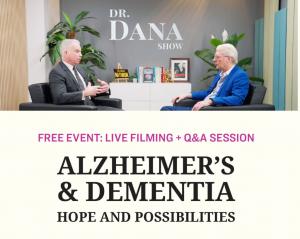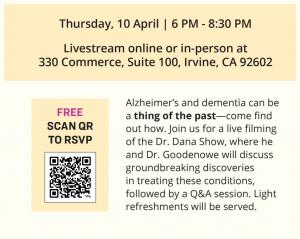
Dr. Dana Show: Q&A Session with Dr. Dayan on Alzheimer’s and Dementia Research
Dr. Dana Show: Q&A Session
ARCADIA, CA, UNITED STATES, April 9, 2025 /EINPresswire.com/ -- The Dr. Dana Show, a leading podcast dedicated to transformative health stories and scientific insights, recently hosted an enlightening interview with Dr. Dayan Goodenowe, a prominent neuroscientist and researcher specializing in Alzheimer's and dementia and also Dr. Churchill's research on Alzheimer's and dementia. The conversation delved deep into the role of plasmalogens, a key lipid in brain health, and how their deficiencies could be linked to the onset of neurodegenerative diseases such as Alzheimer’s, Parkinson’s, and multiple sclerosis.In the most recent episode, Dr. Dana Churchill, the host and a licensed naturopathic doctor, engaged Dr. Goodenowe in a discussion that could redefine how we understand and potentially treat Alzheimer’s. With Alzheimer's affecting over 10 million Americans, Dr. Goodenowe's groundbreaking research presents a hopeful outlook for early detection and possible therapeutic strategies to manage cognitive decline and other age-related conditions.
The Dr. Dana Show: A Platform for Exploring Health Solutions
The Dr. Dana Show has been providing listeners with insightful, expert-driven discussions on holistic health and medical breakthroughs since its inception. Hosted by Dr. Dana Churchill, a functional medicine expert with a focus on healing the whole person, the podcast offers a unique blend of personal stories, scientific findings, and practical health advice. Through thought-provoking interviews, Dr. Churchill brings attention to some of the most pressing health challenges and the emerging solutions that could have a lasting impact.
Understanding Alzheimer's and Dementia: A Growing Concern
Alzheimer’s disease and dementia present significant challenges, not only for patients but also for families and healthcare providers. Approximately every 65 seconds, a new case of Alzheimer's disease is diagnosed in the United States, and more than 10 million individuals currently live with the condition. Alzheimer's and related dementias are not just health conditions; they carry profound emotional and economic consequences, particularly as individuals require round-the-clock care, placing immense pressure on both families and the healthcare system.
While treatments for Alzheimer's have largely been ineffective in slowing its progression, the work of Dr. Goodenowe represents a shift towards more individualized, science-backed approaches. His research on plasmalogens offers a potential pathway to understanding the biochemical mechanisms behind Alzheimer's, which could lead to earlier diagnosis and more effective interventions.
Plasmalogens and Their Role in Brain Health
Plasmalogens are specialized lipids found in brain and heart tissues, essential for maintaining the integrity of cell membranes, supporting brain cell function, and promoting neural communication. Dr. Goodenowe's research has shown that deficiencies in plasmalogens are not just a marker of aging but a key factor in the development of neurodegenerative diseases like Alzheimer’s. This groundbreaking discovery offers a new perspective on the molecular basis of cognitive decline.
One of the most compelling aspects of Dr. Goodenowe’s work is his identification of plasmalogens as a predictive biomarker for Alzheimer’s. Through advanced metabolic profiling, Dr. Goodenowe has demonstrated that plasmalogen levels can be measured years before cognitive symptoms arise, offering the possibility of early intervention and targeted treatment.
Plasmalogen Deficiency and Its Connection to Cognitive Decline
A critical aspect of Dr. Goodenowe’s research is the link between plasmalogen deficiency and cognitive decline. Lower plasmalogen levels have been shown to impair neurotransmitter function and disrupt the brain’s ability to maintain healthy communication between cells. This deficiency is considered one of the key factors contributing to cognitive decline in Alzheimer's patients. In a brain lacking sufficient plasmalogens, neurotransmitter release becomes less efficient, leading to what Dr. Goodenowe describes as “clogged-up” brain communication pathways.
Dr. Goodenowe’s findings suggest that restoring plasmalogen levels may be a powerful tool in slowing or even reversing the symptoms of cognitive impairment. Clinical case studies have shown that some patients who received plasmalogen supplementation experienced improvements in memory and environmental awareness, reinforcing the potential therapeutic benefits of this approach.
The Role of Amyloid Plaques, Tau Tangles, and Inflammation in Alzheimer’s
Amyloid plaques and tau tangles are two hallmark features of Alzheimer’s disease. Dr. Goodenowe’s research reveals that plasmalogens may help prevent the formation of amyloid plaques, which are toxic to brain cells. By restoring plasmalogen levels, the buildup of these plaques may be mitigated, reducing their harmful impact on brain function.
Moreover, tau tangles, another significant hallmark of Alzheimer’s, disrupt the brain’s internal transport systems, leading to cognitive impairment. Research has also shown that inflammation plays a central role in the progression of Alzheimer’s and other neurodegenerative conditions. As Dr. Goodenowe explores the links between plasmalogens, inflammation, and cognitive decline, it becomes clear that restoring plasmalogen levels could be a critical strategy in preventing or delaying the onset of these diseases.
Future Directions: Plasmalogen Precursors and Treatment Approaches
Looking ahead, Dr. Goodenowe’s research on plasmalogen precursors holds promise for developing new treatment options for those suffering from cognitive decline. Omega-9 and Omega-3 plasmalogens are vital for maintaining the myelin sheath, which protects nerve fibers and ensures proper brain function. By introducing these compounds as supplements, scientists hope to provide individuals with the opportunity to restore plasmalogen levels and improve cognitive health.
The possibility of using plasmalogen precursors as a treatment option for Alzheimer’s and other neurodegenerative diseases is a groundbreaking step forward in neuroscience. If successful, these treatments could provide a new way to address the root causes of cognitive decline, rather than merely alleviating symptoms.
A Bright Future for Alzheimer’s Research
Dr. Goodenowe’s research offers a hopeful outlook for the future of Alzheimer’s disease treatment. The ability to predict the onset of cognitive decline through plasmalogen levels could revolutionize how we diagnose and treat neurodegenerative diseases. With continued research and development, the potential for slowing or reversing the progression of Alzheimer’s may no longer be a distant dream.
As the podcast highlights, the intersection of advanced scientific research and holistic approaches to healthcare may be key in unlocking new ways to improve brain health and overall well-being. The findings shared on The Dr. Dana Show provide valuable insights into the future of Alzheimer’s and dementia care, making this episode an essential listen for anyone interested in the future of neuroscience.
About The Churchill Centers
The Churchill Centers is healthcare facilities that integrate conventional and alternative approaches to medical treatment, focusing on both the science and wellness aspects of care. Dr. Dana Churchill, the medical director of The Churchill Centers, brings two decades of experience in the healthcare field, applying both scientific methods and holistic approaches to patient care. Dr. Churchill’s focus is on patient-centered health solutions that incorporate both modern medicine and traditional healing methods to support overall well-being.
Dr Dana Churchill
The Churchill Centers
+1 (626) 842-9123
info@thechurchillcenter.com
Visit us on social media:
Facebook
YouTube
Other
Reverse Brain Aging and Prevent Alzheimer's with this Breakthrough Molecule | Dr. Dayan Goodenowe
Distribution channels: Media, Advertising & PR
Legal Disclaimer:
EIN Presswire provides this news content "as is" without warranty of any kind. We do not accept any responsibility or liability for the accuracy, content, images, videos, licenses, completeness, legality, or reliability of the information contained in this article. If you have any complaints or copyright issues related to this article, kindly contact the author above.
Submit your press release


